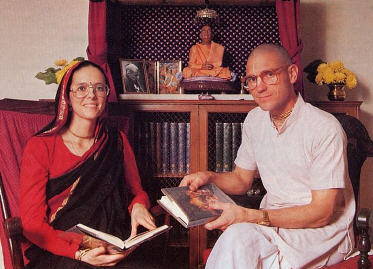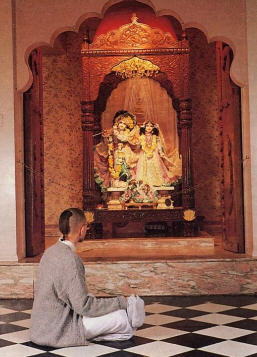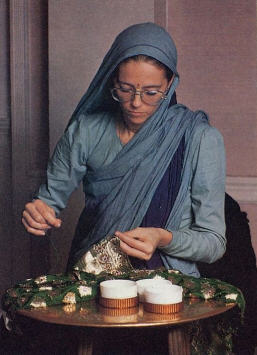A day in the life of a "typical" devotee shows that, along with hard work and regulation, there are freedom, satisfaction, and ever-increasing pleasure.
Many people think the members of the Hare Krsna movement have failed to join the dance of life. They think we are no longer free to experience life's Joys. "Your lives are too restricted," they say. "How can you be happy? You've given up so many of the normal pleasures of life. How can you reject all the things that everyone else holds so dear? Why are you wasting your lives?"
But devotees of Krsna don't feel they're wasting their lives, and although they have given up many things, they don't experience any lack. A devotee's life is filled with variety, though the variety is different from what materialistic persons are accustomed to. Modern society encourages us to be open-minded and to experience life to the fullest, but even the most energetic persons can't experience all the variety of this world. They have to make choices. For example, how many "open-minded" persons have experienced a Sunday Feast at the Hare Krsna temple?

Nagaraja dasa and Pranada Devi Dasi
Devotees are sometimes diminutively labeled "otherworldly." We still live in the world, however, and have many of the same experiences everyone else has. But because we see things differently, we don't experience them in exactly the same way as the nondevotees. We try to see everything in terms of the absolute knowledge of the Vedic literature, which is the philosophical basis for the Krsna consciousness movement. We value those things that contribute to our spiritual lives.
I'd like to describe a day in the life of a typical devotee, but it's difficult to pick one devotee and say he or she is typical. We're individuals, though we do have many things in common. For example, in Philadelphia, where I live, some devotees live in apartments in a building connected to the temple, some live in the neighborhood, and some live farther away. Some devotees work full-time directly for the temple, and others have secular jobs. To give an idea of a devotee's life at the risk of sounding vain I'll describe a typical day in my own life.
I'm married and live in an apartment near the temple, I work full-time for Back to Godhead magazine. My wife, Pranada-devi dasi, who works part-time for Back to Godhead, has a typesetting business and somehow manages to have time for cooking and housekeeping in our apartment. Our day begins at 3 A.M.
"Three o'clock! Why get up at such an ungodly hour?"
Precisely because it's not "ungodly" it's godly. The Vedic literature explains that the last couple of hours before sunrise are especially conducive to spiritual practices. Anyone who rises early in the morning (not necessarily at three o'clock) can verify how one naturally feels more peaceful then than at other times of the day. The peaceful atmosphere helps us concentrate on God.
There's another reason why we get up so early: we don't want to sleep too much. Most devotees sleep six to eight hours, which is plenty for a healthy person. Sleeping is necessary to keep the body healthy, but too much sleep is unhealthy. It's also a waste of time, and time is very valuable to a devotee. People sometimes criticize us as being lazy; we seem to live a carefree life of chanting and dancing. Actually, we are very busy endeavoring to advance in spiritual realization.
Self-realization is not an easy task. It takes a lifetime of dedication to free oneself from the illusion that one is the material body. That illusion is the source of all suffering. Self-realization is so important and human life is so short that devotees want to be sure they make the best use of their time; therefore, they try not to sleep too much.
After rising, I shower, then apply tilaka (sacred clay) to my forehead and twelve other places on my body. By consecrating my body with tilaka, I remind myself that Krsna is within my body as the Supersoul, and that my body is meant for serving Him. Afterwards, I dress in the traditional Vaisnava (devotee of Krsna) clothes, a dhoti and kurta.
While applying tilaka and dressing, I like listening to a recorded lecture by His Divine Grace A C. Bhaktivedanta Swami Prabhupada, my spiritual master and the founder of the Hare Krsna movement. During his twelve years with us, no matter where he was, Srila Prabhupada lectured daily on the science of Krsna consciousness. Most of his lectures, as well as conversations with professors, clergymen, students, and others, were recorded. I relish hearing his voice in the early morning, declaring the immortal truths of the Vedas with complete conviction.
After dressing, I chant the Hare Krsna mantra on my beads. Like all initiated devotees I have taken a vow to chant the sixteen-word mantra nearly two thousand times daily, which takes about two hours to complete.
I chant Hare Krsna to attain pure love for God. I try to chant with devotion and hear the transcendental sound of God's names without any distracting thoughts. Since the mind is naturally restless, this is not an easy task. To chant purely takes practice. That's why I have to chant in a regulated way.
Even though my chanting isn't perfect, I have faith that by practice I can reach the stage of pure chanting, when I'll see Krsna face to face at every moment. I have that faith because the teachings of the Vedic literatures and the testimonies of many great devotees proclaim the benefits of chanting Krsna's names. Indeed, all scriptures declare the spiritual rewards of chanting God's holy names.
I chant on my beads for about an hour before walking half a block to the temple for mangala-arati at 4:15. Mangala means "auspicious," and arati is a ceremony in which a priest offers various articles to the Deities while the congregation sings prayers and songs glorifying the Lord.
For devotees who daily attend the mangala-arati, it becomes a most cherished event. I've been going daily for thirteen years now, and though we sing the same songs every day, I still love singing them. The inspiring sound of a roomful of singing voices, the fragrance of incense and flowers, the rhythms of the drums and the chiming of the cymbals create a festive atmosphere that stimulates remembrance of Krsna and of my position as His eternal servant.
The chanting begins slowly with prayers to the spiritual master and builds gradually into exuberant chanting of Hare Krsna that inspires the assembled devotees to dance and jump with joy. I feel jubilant while chanting Hare Krsna, and that's natural, because Krsna is the source of all joy. When I dance it's not artificial or contrived, nor am I in a mesmeric trance, as some people like to believe. I dance because I feel happy and because I want to please Krsna. If I feel tired or unenthusiastic, I try to chant and dance anyway, and Krsna helps me from within by giving me real enthusiasm.
After mangala-arati I complete the prescribed chanting on my beads, then spend an hour or so in my office or at home studying Srila Prabhupada's books or writing. Reading his books is extremely valuable for anyone who wants to understand the purpose of life and how to attain it. Srila Prabhupada also encouraged his disciples to write about their understanding of Krsna consciousness, so every day I try to make some time for writing.
I return to the temple by seven o'clock and wait with the other devotees for the doors to the Deities' chamber to open and reveal the Deities, freshly bathed and dressed in gorgeous garments and jewelry.
The devotees sing and offer prayers to the Deities for about ten minutes. Then the blowing of conchshells announces guru-puja, an arati ceremony in which we worship Srila Prabhupada. Bhagavad-gita and other Vedic scriptures recommend such worship of saintly representatives of God. Although many of Srila Prabhupada's disciples are now spiritual masters with disciples of their own, guru-puja in the temple is reserved for Srila Prabhupada, without whom most of us would never have heard of Krsna, what to speak of dedicating our lives to loving and serving Him. For this great benediction, devotees for generations will recognize Srila Prabhupada for his special contribution to their spiritual lives.

At guru-puja we especially pray for dedication to the spiritual master, because through him we receive the mercy of Krsna. Without the blessings of the spiritual master, one cannot make any spiritual advancement. This is emphatically stated in all the Vedic literatures. Krsna Himself says that no one can be His devotee without first becoming a devotee of His devotee. Like the mangala–arati, the guru–puja ends with enthusiastic chanting of Hare Krsna.
At 7:30 Srimad-Bhagavatam class begins. Srimad-Bhagavatam means "The Beautiful Story of the Personality of Godhead." It is the cream of the Vedic literature because it specifically deals with the activities and pastimes of Krsna. Srimad-Bhagavatam, written by Srila Vyasadeva the compiler of all the Vedic literature in his mature stage of God realization, contains many conclusive statements about the Absolute Truth. As one of its verses states, regularly hearing from Srimad-Bhagavatam clears all impurities from our hearts, enabling us to perfect our lives by becoming lovers of God. This essential Vedic text is excerpted in Back to Godhead each month.
In the class, we chant the day's Bhagavatam verse, which is in Sanskrit, and a devotee reads Srila Prabhupada's translation and commentary. He then speaks on the verse, saying only what is supported by the Vedic scriptures. To speak on Srimad-Bhagavatam is a great privilege, and one who does so is considered to be representing Srila Vyasadeva. He must not speak anything contrary to Vyasadeva's conclusions. I get the opportunity about once a week to give the Bhagavatam class, and I always find it to be a challenging and enlivening experience.
After speaking for about half an hour, the person conducting the class opens for discussion. Srila Prabhupada said that his followers should never be "dull-headed" but should apply their intelligence to understanding the philosophy of Krsna consciousness. In the Bhagavatam class devotees sometimes offer challenges, testing the Vedic conclusions. Or they ask for clarification on points raised by the speaker or the text. These discussions often bring about lively debates, yet they always end with the superiority of Vedic wisdom shining forth.
Following the discussion the members of our community take breakfast together, relishing prasadam (food offered to Krsna) while conversing or listening to a reading from one of our many texts on the science of Krsna consciousness. By the time breakfast is over, it's nine o'clock. Enlivened by six hours of spiritual practices, and refreshed with Krsna's prasadam, I'm ready to begin my day's work.
Other devotees are ready to start work, too. Some have duties running the temple, some of them go out for preaching, and others tend to their businesses or go to their places of employment.
At Back to Godhead's offices, I edit most of the articles that go into the magazine. Working with other members of the Back to Godhead staff, I also help plan and select articles, illustrations, captions, titles, subtitles, and so forth. I answer readers' letters, some of which are used in our "Letters" column, and I correspond with contributors to the magazine. In addition, I try to write articles regularly. It is challenging and satisfying work, and I feel fortunate to be able to contribute toward spreading Krsna consciousness.
At 1:00 p.m. I break for lunch, which Pranada has prepared at our apartment and offered to our deity of Srila Prabhupada. Then I return to the office and work until around 6:30 P.M.
Pranada and I spend the evening together reading Srila Prabhupada's books. We don't own a television. Even though there may be something of value on TV, we feel our time is better spent in the pure association of Srila Prabhupada's books. Though we read them every day, we're always gaining new appreciation and realization of Krsna consciousness from them. We're not growing tired of them.
In the evening we take a light meal, and we retire around 8:30. The next morning at three, we start the cycle again.
Though from the materialistic point of view my day may seem to lack variety, I find that if I diligently apply myself to the purifying process of Krsna consciousness, I lack no variety of satisfying spiritual experiences. There is plenty of external variety even in regulated temple life, but the real variety, the real taste, takes place internally.
Like everyone else, I want to feel that my activities have value. As an aspiring devotee of the Supreme Lord, Krsna, I know that my real worth comes from my being an eternal spirit soul, an eternal servant of Krsna. I know both theoretically and by my experience that as long as I serve Krsna, I'll be happy.
Everyone can serve Krsna. It's everyone's spiritual, constitutional right. If you want to serve Krsna, despite the burdens of social, professional, and family responsibilities, you will find a way. In the Krsna consciousness movement there is a whole range of services available, and as Krsna explains in Bhagavad-gita, if one cannot serve Him directly by preaching, he can give money to help the preaching work. Krsna sees this as valuable service and as the process for purifying one's ordinary work.

In many ways my situation is ideal for making spiritual advancement I live near the temple, I work directly for spreading Krsna consciousness, and I don't have many worldly responsibilities. While the description of my day may sound simplistic or unrealistic, actually what I have described is my normal day, which changes slightly for things like taking my wife grocery shopping once a week or taking my car to a mechanic once in a while.
But no matter what your occupation, if you follow the rules and regulations for advancing in Krsna consciousness chanting Hare Krsna regularly and refraining from meat-eating, illicit sex, intoxication, and gambling and if you contribute in some way to the spreading of Krsna consciousness, you are a devotee. Krsna accepts your service.
Devotees try to make their lives so full of Krsna conscious activities that they have no time for things that hinder their spiritual development. People often claim to have no time for spiritual life, but if we are serious about spiritual advancement, we will find time for it by eliminating unnecessary activities from our lives.
Many activities outside Krsna consciousness may appear innocent to materialistic persons, but because such activities increase our absorption in bodily consciousness the antithesis of Krsna consciousness aspiring devotees avoid them. Serious students of Krsna consciousness know that such mundane activities retard spiritual advancement.
I don't go to restaurants, nightclubs, theaters, or football games, and I don't feel I'm missing anything. These so-called joys of life are insignificant compared to the pleasure I experience in my regular activities, in the association of people who are seriously trying to purify their consciousness so they can experience life real life to the fullest.
We aren't missing out on anything. We have experienced many things, and now we're experiencing Krsna consciousness. We're not naive. And we're not wallflowers. We're just dancing to the beat of a different drummer.
